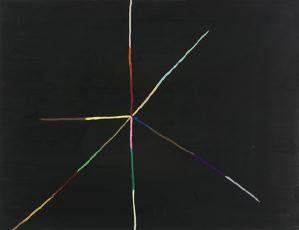Two exhibitions
dal 11/1/2007 al 9/2/2007
Segnalato da
11/1/2007
Two exhibitions
Casey Kaplan Gallery, New York
Miles Coolidge and Pamela Fraser

Miles Coolidge
For his fifth solo show in New York, Los Angeles-based artist, Miles
Coolidge, will present two of his latest photographic projects in Gallery I.
Both works recognize photography's importance in visual and popular culture,
embracing the medium as a conceptual and surrealist tool in the history of
art. Coolidge works between traditional photographic genres and strategies,
de-familiarizing our accustomed approach to our surroundings.
His most ambitious project to date, Wall of Death, is an installation of 20
color photographs that replicates a complete and full-scale representation
of the performing surface of the traveling carnival act, 'Don Daniel's Wall
of Death Motorcycle Thrill Show,' operated by the California Hellriders, who
are based in Swansea, Massachusetts. Each photograph corresponds to one of
the Wall of Death's wooden panels, and the images are mounted edge-to edge
on the gallery wall, echoing how the structure appears when fully assembled.
Coolidge shot the images on the grounds of the Iron Horse Saloon, Ormond
Beach, Florida, during 'Biketoberfest 2006'.
The Wall of Death is a vertical wooden cylinder in which trained motorcycle
and go-kart riders perform for audiences. The riders are held to the sheer
surface by the centripetal force generated by their velocities of 35 mph or
more. Coolidge's 20 images depict the 7' wooden surface on which the riders
perform.
Currently there are 3 Walls of Death in operation in the United States that
travel between motorcycling events in the South, the Midwest and the
Northeast, in addition to others based in Great Britain, Europe and perhaps
elsewhere. Walls of Death are made from wooden panels bolted together and
girdled by cables, designed for easy setup, breakdown and transportation.
Their basic, modular construction (designed to be continually assembled and
reassembled) recalls the functionalism of the early Modernists.
Each of Coolidge's photographs measure 7 x 3-1/2', and are printed with
pigment-based archival inks on glossy inkjet paper overlaid with a
UV-protective matte laminate. The prints are then mounted to 26 gauge
galvanized steel plates. In the gallery each panel is adhered to the wall
with flexible magnetic strips and then positioned edge-to-edge in one row
measuring 70' in total.
Borrowing its title from an architectural term for permanent street
fixtures, Coolidge's second project, Street Furniture, is a more discreet
series of ongoing photographic images that depict obsolete household
furnishings abandoned on sidewalks as trash in the artist¹s neighborhood.
Each image from the ongoing series isolates one found item, presenting it as
exemplary of its type; together the works flesh out a description of the
kinds of furnishings commonly found in contemporary homes. The items chosen
for reclamation were those whose horizontal axis did not match that of the
horizon line, and therefore were photographed frontally with their geometry
aligned to the camera's image rectangle. The effect is to reveal the
arbitrariness of our collective understanding of the world, an intention
that links this work with aspects of the Surrealists' project.
Constructing a body of work that ranges from the banal to the uncanny, the
artist's twist on the pared-down, documentary aesthetic, creates clear but
complex, and ultimately compelling, layers of meaning. Transforming
three-dimensional objects onto flat picture planes, Coolidge balances the
worlds of art and life in such a way that a simple change of perspective
produces images that are inventive and unexpected.
Miles Coolidge was recently featured in 'Modern Photographs from the
Collection XII,' at The Metropolitan Museum of Art in New York and 'First
the Artist Defines Meaning,' curated by Reinhard Braun and Maren Lubbke-Tido
at Camera-Austria in Graz, Austria. His latest solo exhibition, 'Juncture,'
was exhibited at ACME in Los Angeles in June 2006.
**********
Pamela Fraser
For her fourth solo show at Casey Kaplan, Pamela Fraser will present a new
series of gouache and acrylic paintings that take color as their main
subject and test the logic of established color systems. Best known for her
sparse use of bright colors in otherwise empty black or white backgrounds,
Fraser continues in this vein with her latest works of efflorescent,
multi-colors that take shape as industrial paint-chip samples, color wheels
and linear diagrams.
Inspired by her research in comparative color theory (from philosophy to
design to everyday use) with a particular interest in Ludwig Wittgenstein's
Remarks on Color, which pokes holes in the logical understanding of color,
Fraser examines the various ways that color operates and is operated on. She
utilizes heavily inscribed color codes, such as a funky Pucci pattern or the
Ohio State University football team colors, as well as less traditional
color combinations, which fall outside of existing color codes. Both
approaches explore the ineffable quality of color when it becomes detached
from its meaning(s) and encoded logic.
With her resistance to the authority of a single convention, style, or
visual code, Fraser's reductive simplicity achieves a succession of small
gestures and fictitious color schemes through cleverly articulated paint.
Pamela Fraser recently participated in Minimalism and After !V, at The
Daimler Chrysler Contemporary Art Collection in Stuttgart, Germany; Joy Pop!
Pop Art 1960's - 2000's: From Lichtenstein, Warhol to the Current
Generation, at Seiji Togo Memorial Sompo Japan Museum of Art in Tokyo,
Japan; and Extreme Abstraction, at The Albright-Knox Art Gallery in Buffalo,
New York. Beginning in February 2007 she will be featured in a group
exhibition entitled Forest Assembly, at The G.A.D. Gallery in Oslo, Norway.
Casey Kaplan
525 West 21st Street - New York



